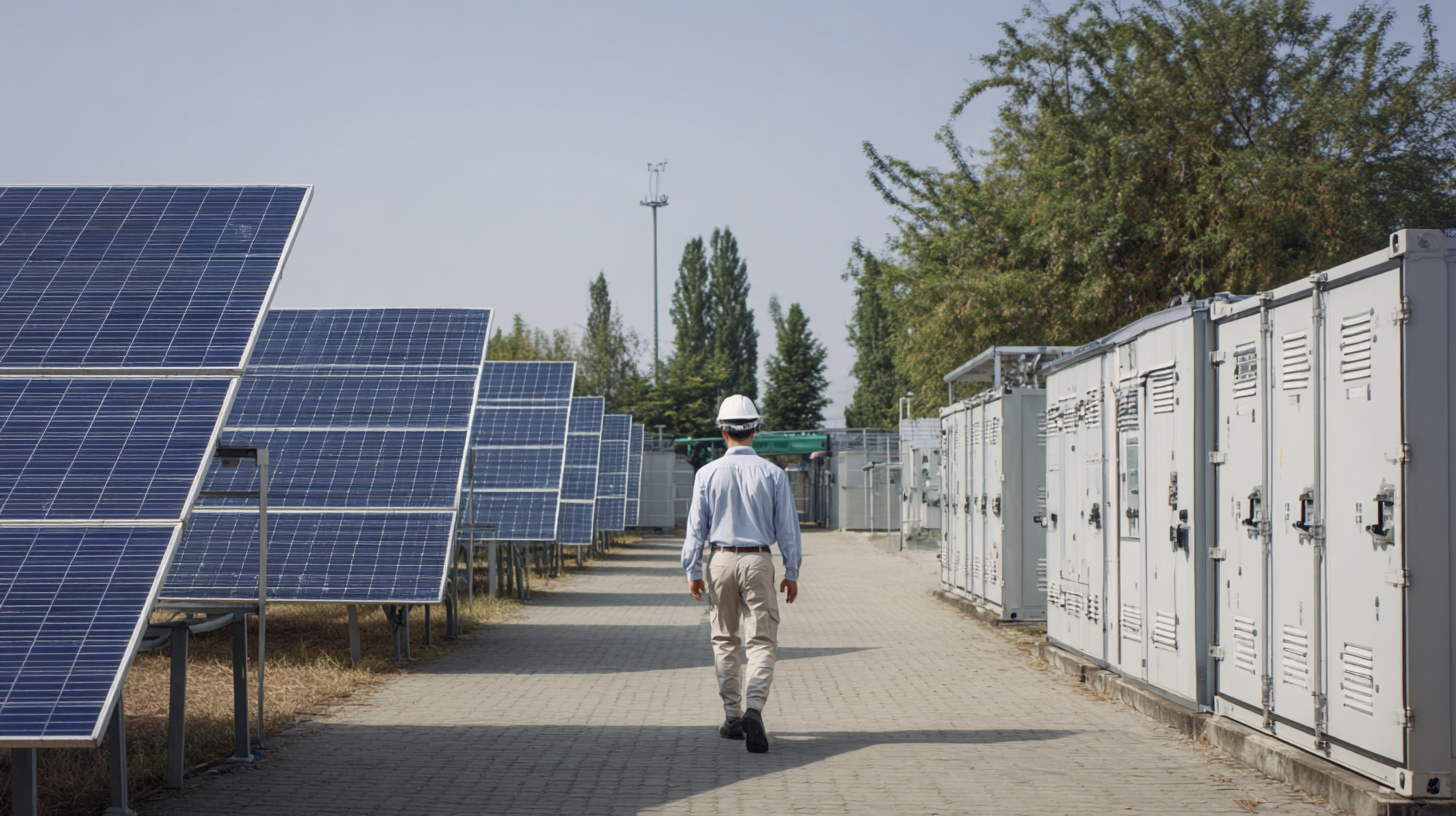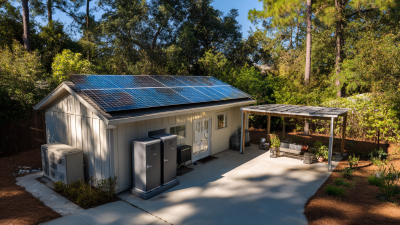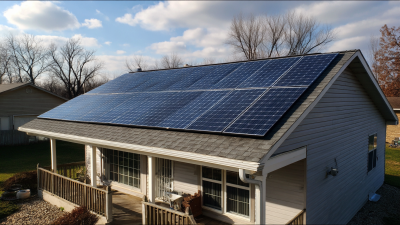MH Energy Your Better Solar and Energy Partner
MH Energy Your Better Solar and Energy Partner
The integration of Solar Energy Battery Storage is becoming increasingly vital in the transition toward a sustainable future. As the global demand for renewable energy sources skyrockets, reports indicate that the solar energy market is projected to reach $223.3 billion by 2026, driven by the necessity for cleaner energies and technological advancements. This burgeoning sector underscores the importance of efficient energy storage solutions, particularly as solar power generation can be intermittent due to its dependency on weather conditions and daylight availability.

Recent studies highlight that the implementation of effective battery systems can enhance the reliability of solar energy, allowing for energy supply to meet demand even during non-productive hours. According to the International Energy Agency, the global battery storage capacity is expected to increase from 9 gigawatt-hours in 2019 to over 200 gigawatt-hours by 2024. Such advancement not only facilitates greater integration of solar energy into the grid but also provides energy security, mitigates greenhouse gas emissions, and fosters energy independence.
Solar Energy Battery Storage is not merely a component of renewable energy systems; it is essential for realizing a resilient energy future. By harnessing the full potential of solar energy through innovative storage technologies, we can significantly reduce our reliance on fossil fuels while paving the way for a cleaner, more sustainable environment.
Solar energy battery storage plays a pivotal role in achieving energy independence, particularly as the global landscape shifts towards renewable energy sources. The off-grid battery energy storage market is projected to experience significant growth, expanding from $19.99 billion in 2025 to an estimated $72.56 billion by 2032. This surge reflects a growing acknowledgment of the necessity for energy resilience and security, enabling households and businesses to harness solar power while reducing reliance on traditional energy grids.
By integrating battery storage systems, users can store excess solar energy generated during peak sunlight hours and utilize it during periods of low generation or high demand. This capability not only enhances energy independence but also stabilizes energy costs and reduces greenhouse gas emissions. As countries and regions strive for sustainability, solar energy battery storage emerges as a crucial technology that empowers consumers to take control of their energy supply, promoting a cleaner and more sustainable future for all.
Integrating battery storage with solar energy systems offers significant advantages, making it a critical component of our transition to a sustainable future. According to a report from the International Energy Agency (IEA), the global storage capacity for renewables, particularly solar, is projected to exceed 300 GW by 2030. This growth is pivotal, as it allows for the optimal utilization of solar energy, mitigating intermittency issues associated with solar power generation. By storing excess energy generated during sunny days, battery systems enable households and businesses to use this power during peak demand periods or times of low sunlight.
Moreover, the economic benefits of solar battery storage cannot be overlooked. A report by BloombergNEF highlights that the cost of lithium-ion battery packs has dropped by 89% since 2010, making solar energy systems more affordable and accessible than ever before. This decline in cost, combined with potential savings on electricity bills and government incentives for renewable energy adoption, underscores the financial viability of integrating battery storage with solar systems. Enhanced grid stability and resilience against outages further strengthen the case for battery storage, as it empowers communities to rely on renewable energy sources, contributing to a cleaner environment and reduced carbon footprint.
Solar battery storage plays a crucial role in enhancing the efficiency of renewable energy use, particularly solar power. By capturing excess energy generated during peak sunlight hours, these batteries allow for a more reliable and consistent power supply. This capability is pivotal in addressing the intermittent nature of solar energy, where production does not always align with consumption needs.
 With effective storage solutions, households and businesses can utilize stored solar energy during evenings or cloudy days, reducing dependency on the grid and minimizing reliance on fossil fuels.
With effective storage solutions, households and businesses can utilize stored solar energy during evenings or cloudy days, reducing dependency on the grid and minimizing reliance on fossil fuels.
Moreover, solar battery storage contributes to grid stability and enhances energy management. It enables users to shift energy consumption to off-peak times, taking advantage of lower energy rates and less strain on the grid during high-demand periods. This flexibility not only helps in reducing energy costs for users but also supports the overall infrastructure by smoothing out demand fluctuations.
As more renewable energy sources are integrated into the grid, efficient battery storage systems become essential for fostering a sustainable future, allowing for greater utilization of clean energy while supporting a reliable energy supply.
When considering a solar energy battery storage system, it’s crucial to evaluate specific factors to ensure optimal performance and longevity. First, assess your energy needs by calculating your average daily energy consumption. This will help you determine the appropriate battery capacity. Choosing a system that meets your energy requirements will maximize your energy independence and efficiency.
Secondly, consider the battery types available on the market. Lithium-ion batteries are popular due to their high energy density and longer lifespan compared to traditional lead-acid batteries. However, they come at a higher upfront cost. Evaluate your budget alongside your long-term energy goals to find the best fit. Additionally, check for warranties and service support, as these can influence the overall value of your investment.
Finally, look into the compatibility of the battery system with your existing solar setup. Some batteries are specifically designed to work seamlessly with certain solar inverters, which could enhance overall system efficiency. Researching and selecting the right combination will ensure you harness the full potential of your solar energy system, leading to a sustainable and reliable energy solution for your home.

Future innovations in solar battery storage technology are paving the way for sustainable growth in the renewable energy sector. As the demand for clean energy solutions increases, advancements in battery technology are becoming crucial in enhancing the efficiency and capacity of solar energy systems. Innovations such as solid-state batteries and lithium-sulfur batteries promise higher energy densities, reduced costs, and longer lifespans, addressing the limitations of traditional lithium-ion batteries.
Moreover, the integration of smart technology, including artificial intelligence and IoT, is revolutionizing how we manage energy storage. These technologies enable real-time monitoring and optimized charging cycles, ensuring that solar energy is efficiently stored and utilized. Additionally, innovative materials, such as graphene and organic compounds, are being explored to create batteries that are not only more efficient but also environmentally friendly. As these advancements continue to evolve, the future of solar battery storage holds great potential for contributing to a truly sustainable energy landscape.






